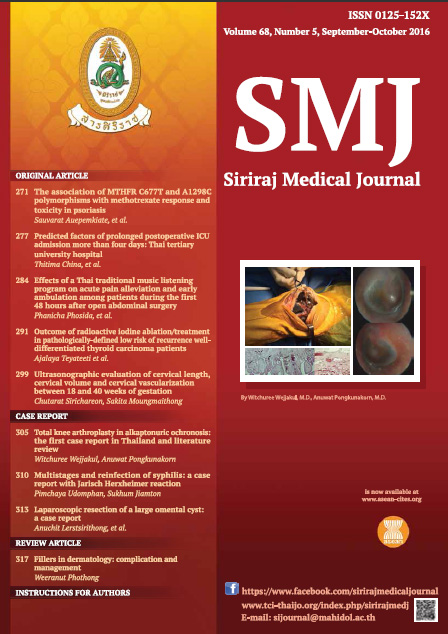The Association of MTHFR C677T and A1298C Polymorphisms with Methotrexate Response and Toxicity in Psoriasis
Keywords:
MTHFR, polymorphism, psoriasis, methotrexateAbstract
Background: Methotrexate (MTX) is used to treat psoriasis with various side effects and responsiveness. No predictive indicator of responsiveness or toxicity is available.
Objective: To study the association of the C677T and A1298C polymorphisms in the methylenetetrahydrofolate reductase (MTHFR) gene with the responsiveness and side effects of MTX in psoriatic Thai patients.
Methods: The polymorphisms were identified from 86 MTX-treated patients in three hospitals located in southern Thailand using allele-specific PCR. The patients were monitored for the effectiveness and toxicity of the MTX.
Results: The C677T genotype frequencies for C/C, C/T, and T/T were 70.9, 26.8, and 2.3%, respectively, and those of the A1298C genotypes for A/A, A/C, and C/C were 57, 32.5, and 10.5%, respectively. Seventy-three patients (87.9%) responded to MTX. The non-responders had higher combined frequencies of C/T and T/T of the C677T (50%) than the responders (24.7%) with no statistical significance (p = 0.131), but had a lower frequency of CC genotype of the A1298C, although not statistically different (p =0.691). Eleven patients (12.8%) suffered toxicity. No association of these polymorphisms and MTX toxicity was found.
Conclusion: The study did not show an association between these MTHFR polymorphisms with MTX response and toxicity in these patients.
Downloads
Published
How to Cite
Issue
Section
License
Authors who publish with this journal agree to the following conditions:
Copyright Transfer
In submitting a manuscript, the authors acknowledge that the work will become the copyrighted property of Siriraj Medical Journal upon publication.
License
Articles are licensed under a Creative Commons Attribution-NonCommercial-NoDerivatives 4.0 International License (CC BY-NC-ND 4.0). This license allows for the sharing of the work for non-commercial purposes with proper attribution to the authors and the journal. However, it does not permit modifications or the creation of derivative works.
Sharing and Access
Authors are encouraged to share their article on their personal or institutional websites and through other non-commercial platforms. Doing so can increase readership and citations.











